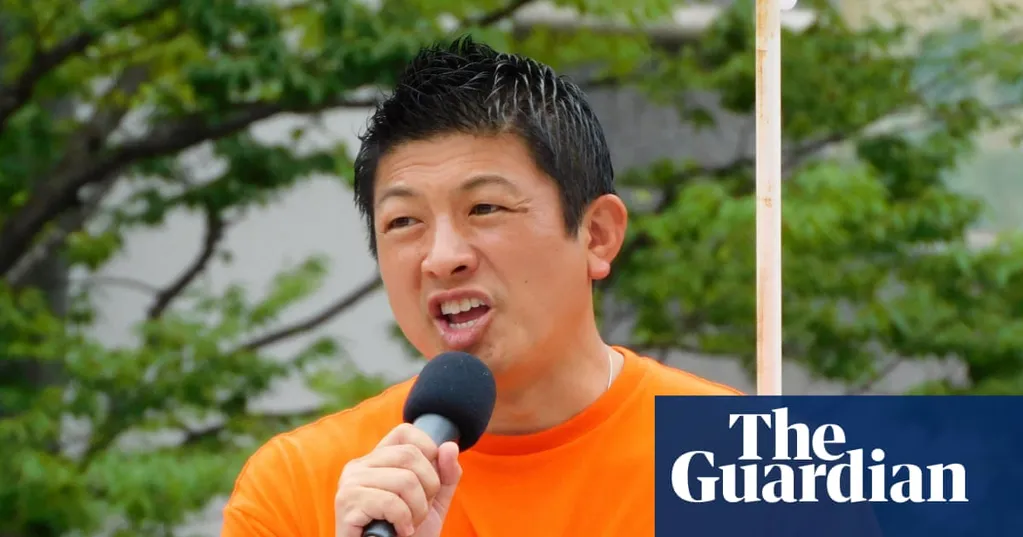Surveys show party may only secure 10 to 15 of 125 up for grabs but is eroding support of prime minister Shigeru Ishiba's shaky LDP minority government.
A disillusioned Japanese electorate feeling the economic pinch goes to the polls on Sunday, as a rightwing party promoting a "Japanese-first" agenda gains popularity, with fears over foreigners becoming a major election issue.
Birthed on YouTube during the Covid-19 pandemic spreading conspiracy theories about vaccinations and a cabal of global elites, the party, Sanseito, has widened its appeal ahead of Sunday's upper house vote - railing against immigration and dragging rhetoric that was once confined to Japan's political fringes into the mainstream.
Polls show the party may only secure 10 to 15 of the 125 seats up for grabs, but it is further eroding the support of prime minister Shigeru Ishiba's shaky minority government, which is increasingly beholden to opposition parties as it clings to power.
Analysts say a heavy defeat for the ruling Liberal Democratic party (LDP) will likely cost Ishiba his job, while a strong showing by the emergent Sanseito could shake up Japan's political landscape.
Sanseito's message has resonated in Japan, where global inflation and a devalued yen have pushed up costs, particularly for food, after decades of almost flat prices. Rice prices in Japan near doubled in the year to June, sparking a political crisis and leading to the resignation of a cabinet minister.
Wages have failed to keep pace, and the sense of a sluggish economy but comfortable lifestyle has given way to a cost-of-living squeeze and growing pessimism about the future. Those on lower incomes are hardest hit, and it is from there that Sanseito is drawing much of its support.
"Many of its followers are first-time voters - the disaffected who feel the mainstream parties have nothing to offer them," says Michael Cucek, an expert in Japanese politics at Tokyo's Temple University.
In its manifesto, Sanseito calls for a return to traditional family values, repealing the LGBT Understanding Promotion Act, "protecting Japan's unique cultural heritage", curbing immigration, and paying universal monthly child benefits of 100,000 yen (£500/US$670) while stopping welfare payments to non-Japanese.
"Anti-foreign sentiment that was considered maybe taboo to talk about so openly is now out of the box," said Jeffrey Hall, a lecturer at Tokyo's Kanda university who has studied Japan's rightwing politics, pointing to Sanseito's online following, appeal among young men and warnings about immigration eroding indigenous cultures.
The party's leader, Sohei Kamiya, a former supermarket manager and English teacher, says he has drawn inspiration from US president Donald Trump's "bold political style". He has drawn comparisons with rightwing, anti-immigration parties in Europe, such as Germany's AFD and Reform UK.
"In the past, anyone who brought up immigration would be attacked by the left," Kamiya told Reuters this week. "We are getting bashed too, but are also gaining support."
The concern over foreign residents comes after Japan recently loosened its relatively strict immigration policies in response to a worsening labour crunch caused by its shrinking and ageing population. The number of foreign-born residents hit a record of 3.8 million in 2024, although that is still just 3% of the total population, a tiny fraction compared with numbers in the US and Europe.
With nearly every sector short of workers, most Japanese people accept the need for more labour from overseas.
Nevertheless, a large influx of outsiders into a relatively homogenous nation that values cultural conformity has triggered some disquiet.
Exacerbating such concerns is misinformation spread on social media, including false claims that a third of welfare recipients are foreigners.
The feelings of undecided voters like Tetsuya Kataoka reflect some of the ambivalence towards foreigners. A shortage of workers at his Tokyo company means he has to take on extra shifts as a driver, and he accepts that Japan needs more immigrants to maintain its economy.
"But I'm struggling financially, and when people hear that foreigners are getting welfare - even if it's only a small percentage of them - they wonder why it's being paid to them instead of cutting our taxes," says Kataoka.
Speaking at the Foreign Correspondents' Club of Japan on 3 July, Kamiya said his party was not in favour of extreme nationalism or protectionism, and was aiming for "global harmony and mutually beneficial international economic relations but not excessive free trade or disregard for national sovereignty".
Kamiya - who won the party's first seat in 2022 after having gained notoriety for appearing to call for Japan's emperor to take concubines - faced a backlash early in this year's campaign for branding gender equality policies a mistake, as they encourage women to work and keep them from having children.
He has since appeared to tone down some controversial ideas formerly embraced by the party. His election manifesto, for example, includes plans to cut taxes and increase child benefits - policies promoted by a raft of opposition parties that led investors to fret about Japan's fiscal health and massive debt pile.
Electioneering on Friday in Gifu, central Japan, Kamiya said the party was now aiming for more than triple of its original target of six seats on Sunday: "With 20 seats, we can submit bills with budgets. Please give us 20 seats."
Cucek thinks it will more likely be in the 10 to 15 range, but that Sanseito will still be able to influence policy. The LDP and other centre-right parties have already reacted to its rise with promises of stricter treatment of foreigners.
As well as spelling the end of Ishiba's premiership, Cucek believes that a crushing electoral defeat combined with the desertion of conservative voters to Sanseito would be a "shake-up that itself will destabilise the LDP", potentially ending the hegemony it has enjoyed since its founding in 1955.
